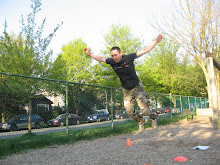Should I Skate More to Get Better at Roller Derby?
Thoughts on Devoting Time to Developing General Athleticism and All-around Physical Development
The best way to get better at roller derby is to practice and compete in roller derby. To a point this makes sense. Roller derby-specific training sessions are the best way to learn the specific skills of your sport (and your position). And, good roller derby training will serve as the basic method to condition you in the specific ways that your sport demands.
The Perils of Too Much Specificity (or too much skating)
This specific training, however, ought to be done in moderation, and it ought to be accompanied by more general athletic training. The reason I want to stress this is because too much specific training for a particular sport engenders imbalance. And in skating sports such as roller derby this can be very pronounced. Hockey players (who, as a group, are much more well-studied than derby competitors) are generally known to have major imbalances between the vastus medialis and the vastus lateralis (crudely the inside and the outside musculature of the thigh) due to the strong strong lateral push of the skating movement. Don't make the same mistake. Perhaps the number one point to take away from this article is that a derby competitor generally shouldn't spend a lot of time skating or reproducing skating-like movements during the off-season and in your non-practice workouts (those done without your team). You will get plenty of skating in during the season as your team practices. Variety in your training will help to build a foundation of general physical development and therefore temper the dangers of too much specificity before it becomes a problem.
Being able to perform a particular sport at a high level does not mean that one has a body in balance. The body may be beat up after a hard season of collisions, lack of proper recovery, and repetitive strain. Certain desirable physical qualities may be lagging behind. It is likely that your strength is down after so much skating and conditioning work. At the end of the season a more general approach to training is called for: pare things down, renew the foundation of strength, and then add on to that foundation before the next season begins. This is also an opportunity to develop and restore your overall heath. Specialization does not make for a healthy individual. Extended periods of hard training along with the stresses of competition, especially when not addressed with plenty of rest and active restoration, can also be detrimental to overall health and well-being.
General Training Phase
General training is done particularly in the off-season and trains your body more generally in broader athleticism, strength,and fitness. It is not geared specifically towards the qualities needed for a specific sport but instead seeks to make the athlete more well-rounded, broadly conditioned, more resistant to injury and more mobile with fewer of the imbalances or gaps that sport-specialized training can open up if trained too much.
This approach to training can help relieve over-training, and both emotional and physical stresses involved in training and competing for a particular set of demands. It is a time to develop general athleticism, meaning that you are developing yourself into a better all-around physical being, who is stronger, faster, more powerful, resilient and with better movement skills than you had last season. Training can include diligent attention to:
-rest & recovery
-addressing imbalance/ restoring balance
-respecting and healing current injuries and attending to those that may be brewing
-strength
-work capacity (this allows you to do more work during a training session or a competition)
-general athleticism
-your weak points as an individual
-variety and fun
I cannot emphasize enough the importance of developing overall strength at this time. Big multi-joint movements such as the squat, deadlift, various forms of pressing and pull-up progressions will go far to getting you ready for your rough sport and will also make the most economical use of your time in the gym. Spend time playing other sports or recreational activities that are far removed from skating. Develop new physical fluencies. Train with athletes from other sports. The point is that you are renewing and developing yourself and also building a strong foundation for more specialized, sport-specific, training. This foundation should be renewed regularly, and shouldn't be rushed. Training guru Gray Cook states things nice and clearly, "The biggest mistake made in sports medicine and sports conditioning today is moving to sport-specific movements too quickly."
In closing I would like to mention that general training is not only for the off-season. During the season too it is important to prevent muscle imbalances and maintain work capacity. This is more difficult to achieve during the demands of frequent practices but as you garner more experience in structuring your off-season training the more successfully you will be able to fit it in during the season.
Subscribe to:
Post Comments (Atom)




great article!!
ReplyDeletei know i adore offseason due to being able to train in other areas.
thanks!
Thanks for dropping by!
ReplyDeleteAl (admin)